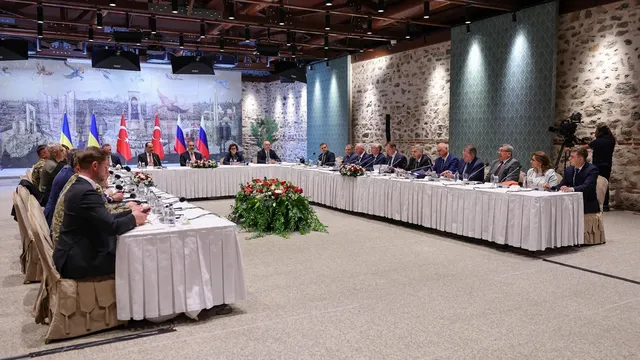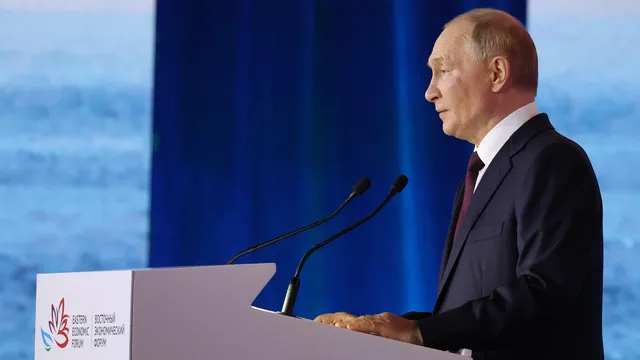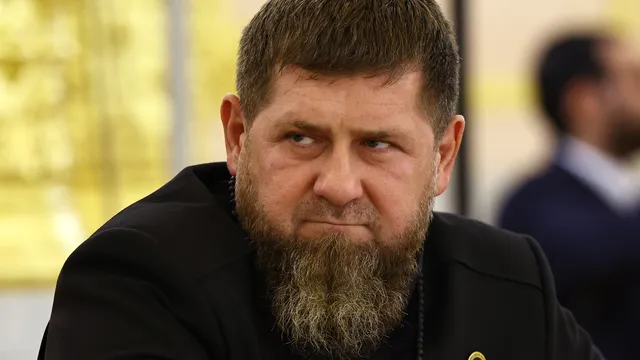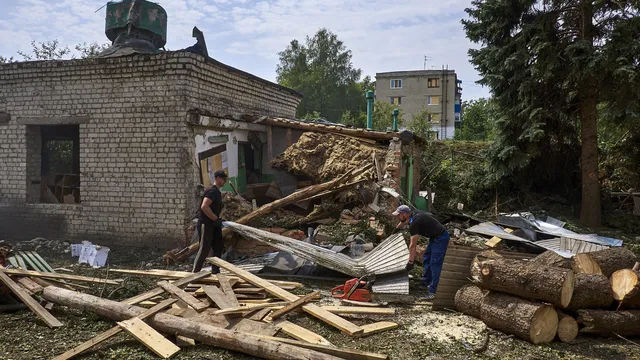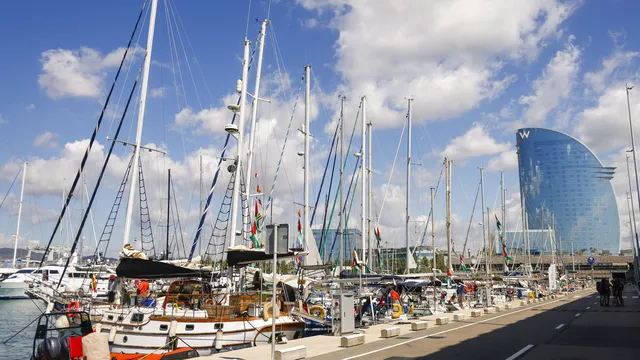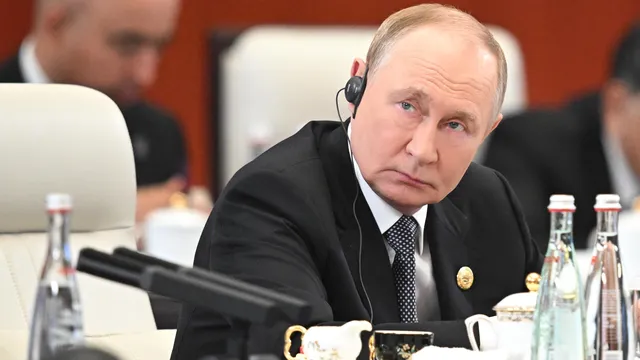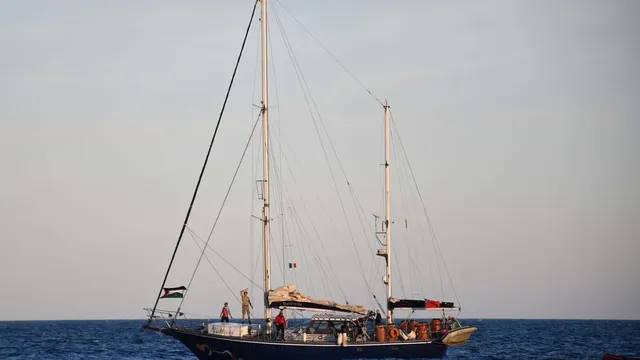The first direct talks between Russia and Ukraine after three years of major war did not lead to a breakthrough in the peace process. The main outcome was that the parties agreed to reach an agreement, although it is unclear where, when, and on what.
The BBC attempted to reflect the outcome of these negotiations and answer the main questions they raised for observers.
Who is satisfied?
“Overall, we are satisfied with the result and are ready to continue contacts.” This first sentence of the laconic statement by the head of the Russian delegation, Vladimir Medinsky, summed up the Istanbul talks for Moscow.
Not so long ago, Ukraine's position was that Kiev would not even agree to discuss a ceasefire without reliable security guarantees from its Western partners. Kiev then stated that any Ukrainian-Russian negotiations were impossible without a ceasefire. Then it said that only direct negotiations between the leaders of the two countries could pave the way to peace.
In the end, the Ukrainian and Russian delegations did sit down at the negotiating table, while the intensity of military operations remained at the same level and a meeting between Vladimir Putin and Vladimir Zelensky was still not on the horizon.
Direct negotiations between Ukraine and Russia are undermining the concept of Moscow's diplomatic isolation, which Kiev has been pursuing with varying degrees of success but very consistently over the past few years. In the end, it now appears that if Ukraine negotiates with Russia, no other country in the world should be ashamed to do so.
Nevertheless, Ukraine's First Deputy Foreign Minister Serhiy Kyslytsya called the talks in Istanbul a “partial success.” Other members of the Ukrainian delegation did not refer to them as a waste of time or a failure.
There are several reasons for this. First, we must not forget that it was US President Donald Trump who came up with the idea that direct negotiations between Kiev and Moscow could end the Ukrainian-Russian war.
That is why many Ukrainian and Western experts compare all the moves by Kiev and Moscow on the subject of negotiations to a one-man show: both sides are trying in every way to convince Trump that they are the ones who wholeheartedly support ending the war as soon as possible, while their opponents are obstructing peace efforts.
At the moment, Kiev understands perfectly well that it is more expensive to criticize Trump's idea. Trump should be thanked and praised, his ideas should be respected, and the other side should be allowed to upset him.
Finally, the only visible achievement of the Istanbul negotiations was the agreement on the largest prisoner exchange since the beginning of the war—a thousand for a thousand. The very fact that a thousand Ukrainian families will soon be able to meet their relatives from captivity, as stated by the Ukrainian negotiators, does not give anyone the right to call this meeting a failure.
"We have a history: it's good if we get an exchange, we have to bring people back. Otherwise, it's very important for the world to see that Putin deliberately sent a weak delegation, deliberately did not give it any powers, deliberately delayed everything. We are convincing the world to increase pressure on Russia, and Putin himself helped with this by sending such a delegation instead of himself," a Ukrainian government source who wished to remain anonymous told the BBC.
Why didn't Putin come?
Since Thursday, the day Vladimir Putin initially proposed the Ukrainian-Russian meeting, the Ukrainian side has made it clear that these negotiations are doomed to failure because of the low level of the delegation Moscow sent to Istanbul.
The question of whether they can really be called, in the words of Volodymyr Zelensky, “a sham,” remains open.
On the one hand, there were no obvious politically powerful figures in the delegation who could match the level of the foreign minister, defense minister, and head of the country's main intelligence service, who arrived in Turkey with Zelensky.
On the other hand, Vladimir Medinsky is among those who helped Vladimir Putin form his firm conviction that Ukraine is a country that has no right to exist. He is said to have helped the Russian president write a well-known article on Ukraine and Russia, which later became the ideological justification for a major war.
Another member of the Russian delegation, Igor Kostyukov, although not the most public figure in Russia, is in fact the head of Russian military intelligence, the GRU. And Deputy Foreign Minister Mikhail Galuzin is responsible in his ministry for the CIS countries, i.e., he is presumably responsible for Ukraine, and, according to some sources, he is close to the head of the Russian presidential administration, Anton Vaino.
In other words, it is not very accurate to refer to these individuals as “technical personnel,” as some Ukrainian and Western commentators have been quick to do.
Furthermore, one could argue against the criticism of the composition of the Russian delegation; at the recent Russian-American talks in Saudi Arabia, Moscow was represented by the highly influential and high-ranking Sergey Lavrov and Yuri Ushakov, but this does not seem to have made the meeting any more effective.
Another issue is that it is difficult to counter the argument of Volodymyr Zelensky and his supporters that the only person in Russia who can make strategic decisions regarding the war against Ukraine is Vladimir Putin himself. However, his arrival in Istanbul was initially considered unlikely.
First, it is difficult to imagine Putin flying without absolute necessity to meet the man who embodies the fiasco of the “second army of peace” in Ukraine, the man whom the Russian leader until recently described as the illegitimate leader of Ukraine.
Second, and this explanation can be found in the Russian media, Putin's political style suggests that he avoids improvisation and surprises. His visits to important negotiations are always preceded by lengthy preparatory work, and he simply sees no point in discussing fundamental agreements on the fly.
Finally, Vladimir Putin was probably aware that in the very first minute of the meeting in Istanbul, he would hear from Vladimir Zelensky a proposal or even an ultimatum for a 30-day ceasefire. Putin does not want to stop military action without preconditions and makes no secret of this, but he also did not want to appear to the world as someone who could have stopped the death and destruction with a single word but did not do so for reasons that are difficult to explain. That is why he ignored Zelensky's proposal for a meeting.
Why did the agreement not work?
The main key to understanding why the negotiations in Istanbul did not result in a breakthrough lies in the differences in the expectations of the parties to the meeting.
The number one issue for the Ukrainian delegation in Istanbul was to discuss the terms and implementation of a ceasefire for at least thirty days. According to representatives of the Ukrainian side, if the guns fall silent, this will create a suitable atmosphere for further negotiations on a more sustainable peace.
On the other hand, Russia's representatives insisted on discussing the “root causes of the Ukrainian conflict.” According to the most widespread interpretation, these root causes are what Russia sees as “the destruction of the common spiritual space of the former Soviet Union and the Russian Empire” in Ukraine's quest for independence, as well as Western intrigues aimed at Russia's strategic defeat.
Moscow agreed to a ceasefire only after these root causes were removed.
Of course, with such preconditions, it was difficult to expect that the negotiations would lead to significant progress towards peace.
And yet it happened. The tone of the negotiations was set by the fact that the meeting between the Ukrainian and Russian delegations began without a handshake. The negotiators found it difficult to find a common language – in the literal sense of the word: at the negotiating table, the Ukrainian and Russian delegations communicated through an interpreter.
Formally, the door to further progress towards peace is not closed: according to Vladimir Medinsky, by the next meeting, the Ukrainian and Russian delegations “will present their vision for a possible future ceasefire, will set it out in detail,” and then, as should be understood, there will be a discussion of this vision.
However, it would be naive to believe that the mere existence of concrete peace plans will significantly accelerate the peace process: Ukraine and Russia have seven years of experience in discussing a specific algorithm for ending hostilities, agreed at the highest political level. Of course, it is too early to say that the Istanbul process could turn into a process similar to the Minsk process, only accompanied by a full-scale war in the hot phase, but such a prospect is worth considering.
Is this a continuation of “Istanbul-2022”?
Another significant disagreement between the representatives of Kyiv and Moscow concerned the nature of the current negotiations.
For Moscow, this is a direct continuation of the negotiation process that began in the spring of 2022—and was interrupted in the same spring. Vladimir Putin has repeatedly stated that a new peace process is only possible in the form of a return to a specific document “initialed” by the Ukrainian delegation in Istanbul in 2022. In this regard, even the appointment of Vladimir Medinsky, who held this post three years ago, as head of the Russian delegation for Istanbul 2025 is largely a symbolic step.
The problem is that the Ukrainian side claims that its representatives did not initial any documents in 2022. Moreover, Ukrainian historiography interprets this negotiation process as an attempt by Moscow to impose on Kiev a discussion of the terms of Ukraine's capitulation: this is how Kiev views Russia's demands to limit the number and scope of the Ukrainian army's weapons, to renounce military cooperation with Western partners, and its intention to join NATO. Accordingly, Kiev has no desire whatsoever to return to these negotiations.
The situation is as follows: Ukraine says it cannot enter the same Istanbul twice and that negotiations must start from scratch. Russia says that from the moment the negotiations end in 2022, but “taking into account the realities on the ground.”
The “realities on the ground” obviously mean the “annexation” of four Ukrainian regions by Russia, over none of which the Russian army has full control, but now demands the withdrawal of Ukrainian troops from these regions.
But that's not all. According to media leaks, during the current negotiations, Russia has set new conditions for starting a full-fledged peace process: it has threatened to take over Kharkiv, demanded the creation of a “security zone” in the Sumy region and, finally, through Vladimir Medinsky, reminded that Russia once fought Sweden for 21 years and asked: how long are you, Ukrainians, prepared to fight?
The BBC was unable to confirm that such threats were actually made during the negotiation process. However, Vladimir Medinsky cited the example of the 21-year war with Sweden as an argument for Russia's willingness to fight for a very long time during an interview with VGTRK after the end of the negotiations.
The Ukrainian delegation is obviously cautious about such rhetoric from its opponents.
"I cannot disclose the content of the negotiations, it would be incorrect. I can only confirm that (during the negotiations on the Russian side) there were a number of demands that we consider unacceptable. We were prepared for this, we knew it would happen, so the Ukrainian delegation maintained a very calm tone and calmly defended its line and expressed its position. We believe that the Ukrainian delegation did this quite effectively and efficiently," Ukrainian Foreign Ministry spokesman Heorhiy Tyshyi told reporters.
What will happen next?
Formally, the parties have agreed that negotiations between Ukraine and Russia will continue.
Another issue is that the Russian side seems to want to divert the discussion to the notorious “root causes of the conflict” or the technical details of what a ceasefire should look like, without actually implementing it. On the other hand, Ukraine is determined to insist on a direct meeting between Volodymyr Zelensky and Vladimir Putin, apparently in the hope that the leaders who play a key role in their countries' political systems will be able to reach an agreement in principle on a ceasefire.
At least two factors could influence the current situation.
First, the threat of tougher sanctions against Russia made by the leaders of the United Kingdom, Germany, Poland, and France after their visit to Kyiv last weekend, which kicked off the process that led to the current negotiations in Istanbul.
Kiev supports increasing sanctions pressure on Moscow, regardless of the Istanbul process that has begun.
In fact, Putin did not comply with the Europeans' condition by refusing to agree to a 30-day ceasefire.
But whether they will carry out their threat is an open question. And the answer depends directly on the position of US President Donald Trump. His reaction to the Istanbul talks is the second factor that could move the situation forward.
After all, it was Trump who received calls from European leaders on the day the threat of increased sanctions against Russia was made. And it was his position that became the real reason why Zelensky decided to respond to Putin's call for direct negotiations and personally travel to Turkey, and then send part of the Ukrainian delegation to Istanbul.
For now, Trump's position leaves many questions unanswered. The politician, who has long supported direct negotiations between Ukraine and Russia, now claims that nothing can be achieved without his personal involvement in the process. At the same time, he is actually refusing to visit Istanbul, which could theoretically force Vladimir Putin to show up there as well.
The latest news on this front is that Donald Trump has not ruled out calling Vladimir Putin on the Ukrainian issue as soon as possible. On the other hand, on Friday he held another telephone conversation with Vladimir Zelensky, Emmanuel Macron, Friedrich Merz, Keir Starmer, and Donald Tusk.
Most likely, the development of the situation around the negotiations between Ukraine and Russia and, more broadly, around the war unleashed by Russia, directly depends on which of these conversations has made or will make a greater impression on Donald Trump. І BGNES
Neshkov: North Macedonian Prime Minister Mickoski does not believe in the European Union
North Macedonian Prime Minister Hristijan Mickoski does not believe that his country will become a member of the European Union in 2030.
This was stated in an interview with Bulgarian National Radio by journalist and Western Balkans expert Lyubcho Neshkov, owner of Bulgaria's largest news agency BGNES.
"European Council President Antonio Costa openly stated to North Macedonian Prime Minister Hristijan Mickoski that Skopje has no plan B for joining the European Union. There is only one option for North Macedonia to start negotiations for EU membership, and that is to fulfill its commitments," Neshkov said, commenting on the results of Costa's visit to Skopje yesterday.
The journalist also quoted Mitskoski's words to Euronews Serbia, which the Macedonian prime minister said on the day of Kosova's visit. When asked by the host if he believed that North Macedonia would join the European Union in 2030, Mickoski replied categorically that he did not believe so.
“Mickoski has definitely decided that the country will not be independent and will not be part of the European family. While we are talking about the European Union and integration, he is talking about an economic union with Belgrade and Budapest,” journalist Ljubcho Neshkov emphasized.
The Macedonian prime minister is copying the behavior of Serbian President Aleksandar Vučić, who is known for his vulgarity and primitivism. An example of this is the response that Mickoski gave to Kosha when the issue of including Bulgarians in the Constitution of North Macedonia was raised – a key condition for starting negotiations with the EU. The Macedonian prime minister told Kosha that he would also include the Portuguese, a reference to the nationality of the high-ranking European official.
"Mickoski is just another tool of this primitive policy. The fate of Macedonian citizens is sad and tragic. It is sad because they are forced to live every day in conditions of verbal aggression," explained journalist Ljubcho Neshkov.
According to him, only public pressure can change the situation in North Macedonia. І BGNES

 Breaking news
Breaking news
 Europe
Europe
 Bulgaria
Bulgaria
